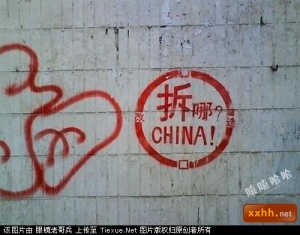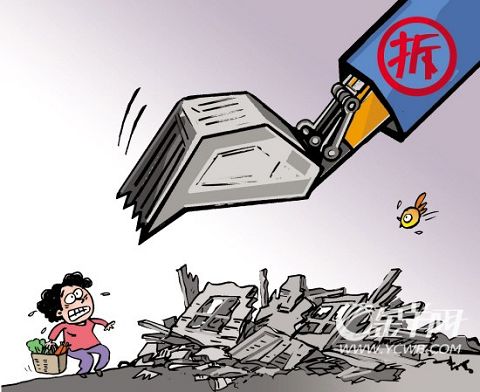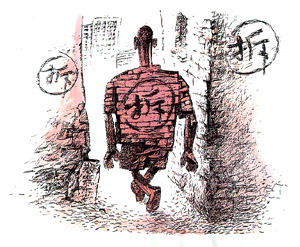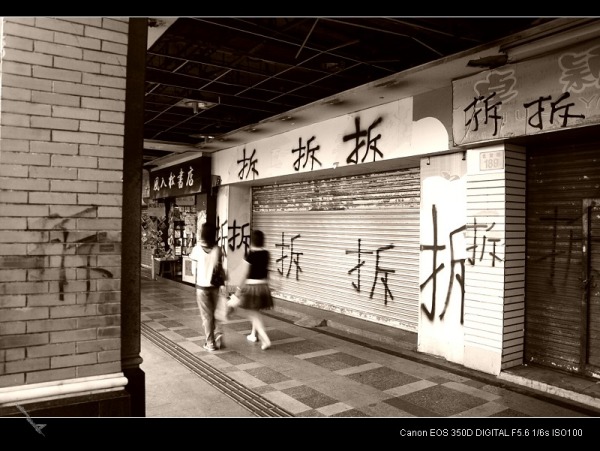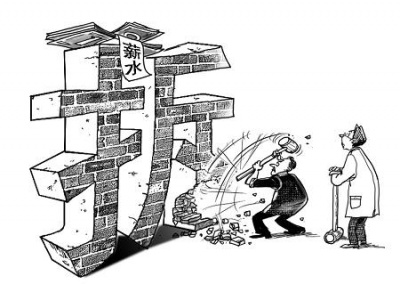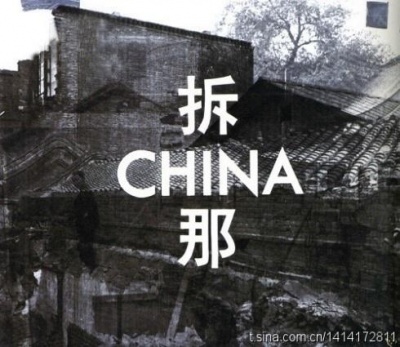“Demolish it”的版本间的差异
来自China Digital Space
| 第1行: | 第1行: | ||
| − | 拆哪 (chāi nǎ) demolish | + | 拆哪 (chāi nǎ) Demolish it; literally “Where to demolish?” |
| − | + | [[File:demolishit1.jpg|300px|thumb|left|]] Chāi na mimics the English “China.” Chāi 拆, “demolish,” has a special meaning in China. Housing demolitions, often forced on tenants with little or no compensation, are one of the major sources of social instability in China. Developers and the local government profit greatly from [http://chinadigitaltimes.net/2012/02/scenes-from-a-forced-demolition/ forcibly evicting] people from their homes and rebuilding on the land. Anger over eviction and demolition lead the people of [http://chinadigitaltimes.net/china/wukan/ Wukan], Guangdong to fight the local government, eventually laying siege to their village in December 2011. | |
| − | + | Nǎ 哪 means “where” or “which.” Hence, “chāi nǎ” also sounds like the question, "Demolish where?" and mocks the ubiquity of demolition. | |
| − | + | All over China, one sees “拆” spray-painted on the sides of buildings slated for demolition. People who have had their homes demolished are called chāiqiānhù 拆迁户. | |
| − | [ | + | Victor Mair has a collection of nicknames for China, including chāi nǎ, at [http://languagelog.ldc.upenn.edu/nll/?p=4026 Language Log]. |
| − | + | <feed url="feed://chinadigitaltimes.net/china/forced-demolition/feed/" entries="5"> | |
| + | == [{PERMALINK} {TITLE}] == | ||
| + | '''{DATE}, by {AUTHOR}''' | ||
| + | </feed> | ||
| − | [[File:demolishit3.jpg|400px|thumb|center|'' | + | [[File:demolishit2.jpg|600px|thumb|center|''Bulldozer with the character “demolish” written on it. The bulldozer is shown as the extension of the bureaucratic arm.'']] |
| + | |||
| + | [[File:demolishit3.jpg|400px|thumb|center|''“demolish”'']] | ||
[[File:demolishit4.jpg|600px|thumb|center]] | [[File:demolishit4.jpg|600px|thumb|center]] | ||
| − | [[File:demolishit5.jpg|400px|thumb|center|'' | + | [[File:demolishit5.jpg|400px|thumb|center|''The “God of Wealth” is the head of demolitions, wearing a robe emblazoned with the character “corrupt.” He is awarding a contract to a developer in exchange for a gold ingot.'']] |
| − | [[File:demolishit6.jpg|400px|thumb|center|'' | + | [[File:demolishit6.jpg|400px|thumb|center|''This man’s salary lays atop a large “demolish” character.'' |
]] | ]] | ||
| − | [[File:chaina.jpg]] | + | [[File:chaina.jpg|400px|thumb|center]] |
[[Category: Grass-Mud Horse Lexicon]] | [[Category: Grass-Mud Horse Lexicon]] | ||
2012年6月26日 (二) 20:30的版本
拆哪 (chāi nǎ) Demolish it; literally “Where to demolish?”
Chāi na mimics the English “China.” Chāi 拆, “demolish,” has a special meaning in China. Housing demolitions, often forced on tenants with little or no compensation, are one of the major sources of social instability in China. Developers and the local government profit greatly from forcibly evicting people from their homes and rebuilding on the land. Anger over eviction and demolition lead the people of Wukan, Guangdong to fight the local government, eventually laying siege to their village in December 2011.
Nǎ 哪 means “where” or “which.” Hence, “chāi nǎ” also sounds like the question, "Demolish where?" and mocks the ubiquity of demolition.
All over China, one sees “拆” spray-painted on the sides of buildings slated for demolition. People who have had their homes demolished are called chāiqiānhù 拆迁户.
Victor Mair has a collection of nicknames for China, including chāi nǎ, at Language Log.
<feed url="feed://chinadigitaltimes.net/china/forced-demolition/feed/" entries="5">
[{PERMALINK} {TITLE}]
{DATE}, by {AUTHOR} </feed>

